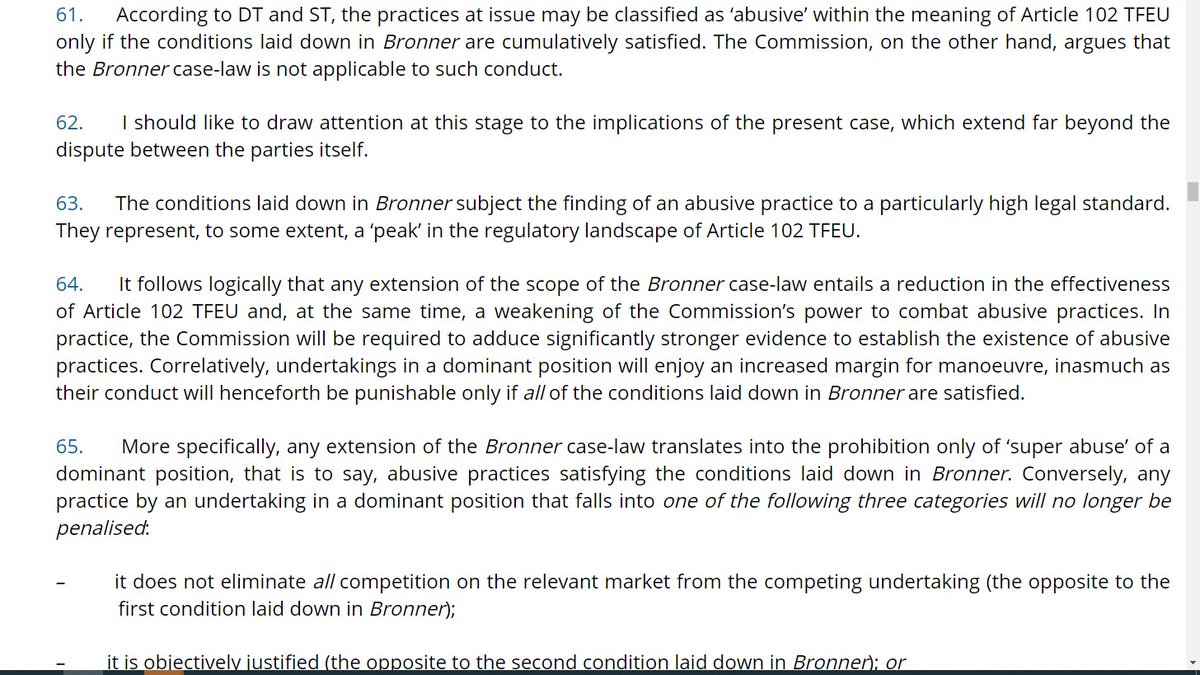
Quick thread on the Opinion of the AG in Deutsche Telekom and Slovak Telekom (DT & ST) v Commission (C-152 and 165/19 P) curia.europa.eu/juris/document… For antitrust geeks only 1/n 

The Opinion asks whether a firm w/o an indispensable infrastructure can nonetheless abuse a dominant position by way of margin squeeze. 2/n
To this normative question, the AG answers positively. I beg to differ. Note: my disagreement is with the AG’s reasoning, not about the outcome of this case or others. 3/n
So here’s the issue. Under the Bronner case law, an antitrust duty to deal arises when a dominant firm controls an indispensable input. The indispensability requirement is quite demanding on complainants. It sets a high bar. 4/n
Should we apply the demanding Bronner indispensability filter in all margin squeeze cases Y/N? 5/n
In their ongoing appeal, defendants DT and ST found guilty of unlawful margin squeeze a century ago by @eucomp say Y => a margin squeeze is an “implicit” refusal to deal. Upshot? The Commission must also establish indispensability, as in an explicit refusal to deal case 6/n
The AG says N. To that end, he draws a line between 2 categories of conduct. On one hand, there are “refusals to make available”. On the other, there are abusive “terms” of an agreement. Different tests apply. 7/n
The Bronner test only applies only to the first category. A margin squeeze is in the second category. 8/n
The AG Opinion is not in innovation mode here. The case law in TeliaSonera had already presented margin squeeze as a “pricing practice”, falling under Article 102 a) ie => “terms”. 9/n
But the Opinion is in logical contradiction mode. By way of illustration, and to paraphrase the AG’s own words, does contractual tying – A cannot be purchased without B – not constitute both unfair terms (under article 102 d)) and a refusal to make available product A alone? 10/n
The AG does not subject his distinction between “terms” and “refusals to make available” to the same stress test of consistency than the one to which he subjects the defendants’ distinction between “implicit” and “explicit” refusal to deal. 11/n
Yet, he concludes that the defendant's distinction is “spurious”. I cannot be convinced. There should be no double standards in terms of the legal analysis 12/n
Bottom line? The only obvious, and logical answer, to the initial question, is Y. As I wrote in the past if a dominant firm can lawfully exclude rivals by refusing to deal, how can it be guilty of abuse when it accepts to deal with them? 13/n
Or put differently, if the dominant has the choice between lawful and unlawful exclusion, it will go for the first one. 14/n
IMHO, there is more cause for discussion in the underlying normative view that is the undercurrent of the Opinion. 15/n
The AG considers that the effectiveness of competition is key. So far so good. But then, the AG says an extension of the Bronner indispensability condition “entails a reduction of the effectiveness of Article 102 TFEU”. Ahem. Sorry, but no. 16/n
Having a clear, consistent, and logical test in the case-law upon does contributes effectiveness by focusing the discussion on questions of evidence. 17/n
Having an additional test that covers conduct that falls within the amorphous category of “terms” is a recipe for endless preliminary discussions about the legal standard, cluttering enforcement initiatives from the outset. 18/n
Besides, as I have said elsewhere again, indispensability is high, but not so high. See papers.ssrn.com/sol3/papers.cf… 19/n
To close, one last remark. An attentive reader might sense some implicit priors in the Opinion. Read para 64 carefully. 20/n 

A more neutral formulation would have been “a weakening of the commission’s power to combat practices”, not “abusive practices”. Use of abusive reads as if AG had predetermined that the “terms” set by a dominant firm are abusive. This is not, and should be, the law. END/
@threadreaderapp unroll
• • •
Missing some Tweet in this thread? You can try to
force a refresh


